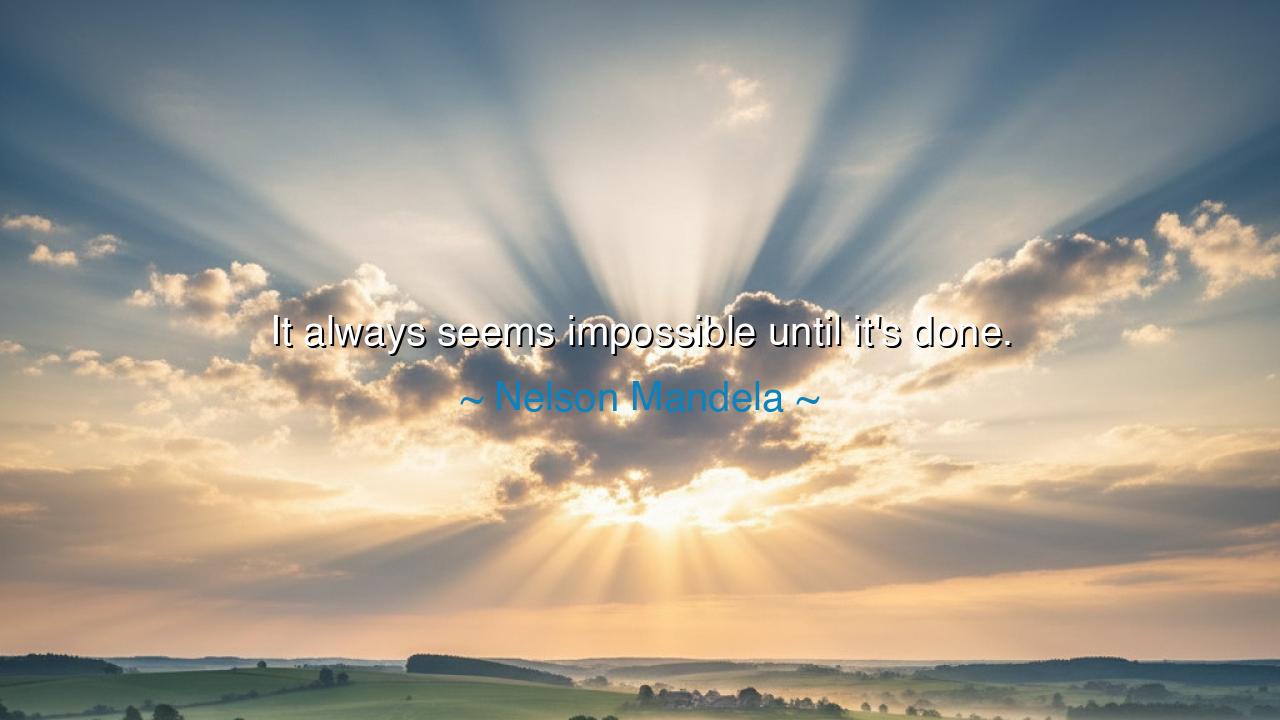
It always seems impossible until it's done.






The great Nelson Mandela, who endured chains and yet walked as a free man in spirit, gave us this immortal truth: “It always seems impossible until it’s done.” These words rise like a trumpet-call through the ages, proclaiming that what the fearful call “impossible” is but the veil before victory. For the eyes of men, clouded by doubt, often see walls where there are only doors yet unopened. The impossible is not a sentence—it is a challenge to the brave.
To the fainthearted, every mountain appears too high, every river too wide. But history whispers otherwise: each age has borne burdens thought insurmountable, and yet each age has given birth to heroes who shattered the chains of impossibility. Mandela, who spent long years in the darkness of prison, spoke not from fancy but from fire. He had faced what the world called impossible—the end of apartheid, the unity of a divided nation—and through faith, endurance, and struggle, he saw the “impossible” fall at his feet like dust.
Consider the story of the Wright brothers, mocked by many as fools for daring to dream of flight. Learned men declared heavier-than-air machines could never rise into the sky. Yet the brothers persevered, their vision fueled not by certainty but by stubborn courage. And when their craft lifted from the sands of Kitty Hawk, the impossible was done. What once provoked laughter became the seed of a world where the heavens themselves were traversed.
So too, in the battles of nations, the “impossible” is but a shadow. Recall the march of Gandhi and his followers to the sea, when he defied an empire with nothing but his bare feet and the cry of justice. To many, liberation seemed distant, absurd, unattainable. Yet the salt he lifted from the shore became a symbol of defiance, and the movement he stirred broke the mightiest empire on earth. The “impossible” dissolved before the quiet, relentless strength of ordinary men and women who refused to bow.
The meaning of Mandela’s words is clear: impossibility lives only in the mind. It is the language of hesitation, the fortress built by fear. Once the deed is accomplished, the walls of doubt crumble, and men wonder why they ever believed the barrier was real. The great tasks of life are not accomplished by those who wait for certainty, but by those who act despite uncertainty. The impossible yields only to those who dare.
The lesson for us is as sharp as a blade: do not cower before the word “impossible.” Instead, take one step forward, even if it trembles. Break the vast into the small, the overwhelming into the possible act of today. Let the dream burn like fire in your heart, but let your hands shape it stone by stone, hour by hour. For every towering achievement was once a fragile beginning, every triumph once a trembling attempt.
Practical action follows: when a task feels too great, begin with what you can. When the voice of doubt cries “it cannot be,” answer with labor, answer with persistence. Surround yourself with those who dare to dream, and turn deaf ears to the chorus of fear. Write your vision, work at it daily, and let time prove that the impossible is but another word for “not yet done.”
Thus remember Mandela’s eternal truth: “It always seems impossible until it’s done.” Let it echo when you face hardship, let it steel your will when others doubt, and let it guide you when your strength falters. For once the deed is accomplished, the impossible will appear small, and your courage will stand as testimony to those who follow after you.






AAdministratorAdministrator
Welcome, honored guests. Please leave a comment, we will respond soon